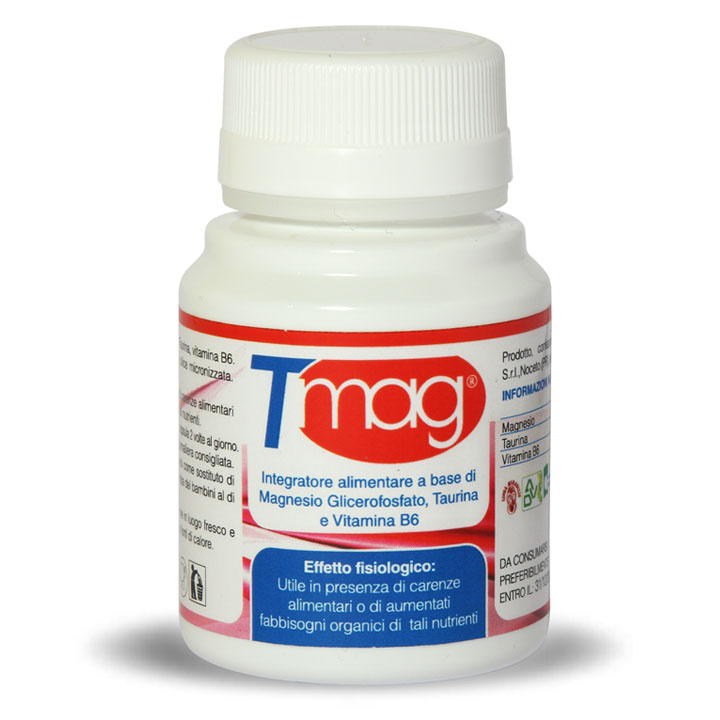
Highly bioavailable magnesium glycerophosphate to promote calm and relaxation
HEALTH BENEFITS:
T-MAG® is a food supplement based on Magnesium, Taurine and vitamin B6, useful in case of food deficiencies or an increased need for these nutrients.
Stress, today’s hectic pace, and an unbalanced diet tend to deplete Magnesium reserves very quickly and can give rise to symptoms of magnesium deficiency such as tiredness, anxiety, tremors, insomnia, reduced ability to concentrate, cramps as well as constipation, tachycardia, hypertension and premenstrual syndrome. Magnesium is one of the most important minerals in our body, it regulates over 325 biochemical reactions and is essential for calcium absorption. Magnesium tends to be eliminated in the urine, but when combined with vitamin B6 and Taurine its capacity for intracellular penetration is increased and its elimination is drastically reduced. The components of T-MAG® work in synergy, improving the ability to manage psycho-physical stress; they promote the activation of cellular energy metabolism and help improve neuromuscular transmission and the ability to use oxygen.
T-MAG® promotes concentration and attention levels and has a positive effect on memory.
INGREDIENTS:
- Magnesium glycerophosphate
- Taurine
- Vitamin B6
- Anti-caking agents: magnesium stearate, micronized silica.
PROPERTIES OF THE INGREDIENTS:
- Magnesium glycerophosphate: it is one of the most bioavailable forms of intracellular magnesium. It is optimally assimilated and guarantees a high gastrointestinal tolerance. It regulates over 325 enzymatic reactions, the synthesis of nucleic acids (DNA and RNA), cell permeability and muscle contraction. Essential for the absorption of calcium. It actively participates in energy production reactions (Krebs cycle).
- Taurine: it stabilizes and maintains the integrity of the cell membrane. Essential for the functionality of the brain, heart, eyes and vascular system. It regulates the flow of calcium and magnesium, which in turn regulates the contraction of the heart muscle. It improves hepathic metabolism and has a detoxifying action. It has a calming and stabilizing effect on the nervous system. It improves cardiac performance in sports people during physical effort.
- Vitamin B6: essential for the synthesis of neurotransmitters. It improves the ability to manage stress. It intervenes in the synthesis of hemoglobin and plays a fundamental role in the production of red blood cells. It acts in the conversion of homocysteine into cysteine. Essential for the synthesis of DNA and RNA. It activates the enzymes involved in the metabolism of carbohydrates, fats and proteins.
HOW TO USE:
1-2 capsules twice a day before the main meals
PACK:
60 capsules
vegetable cellulose capsules
NOTES:
Gluten Free
ICEA VEGAN certified product
| AVERAGE CONTENT OF CHARACTERISING INGREDIENTS | PER DAILY DOSE (2 CAPSULES) | RDA |
| Magnesium | 56 mg | 15% |
| Taurine | 484 mg | |
| Vitamin B6 | 3,0 mg | 214% |
Bibliography:
- Champagne C.M. Magnesium in Hypertension, Cardiovascular Disease, Metabolic Syndrome, and Other Conditions: A Review Nutr Clin Pract, Apr 2008; 23: 142 – 151.
- Hunt CD and Johnson LK Magnesium requirements: new estimations for men and women by cross-sectional statistical analyses of metabolic magnesium balance data Am. J. Clinical Nutrition, Oct 2006; 84: 843 – 852.
- Nielsen FH, Milne DB, Klevay LM, Gallagher S, and Johnson LK. Dietary Magnesium Deficiency Induces Heart Rhythm Changes, Impairs Glucose Tolerance, and Decreases Serum Cholesterol in Post Menopausal Women J. Am. Coll. Nutr., Apr 2007; 26: 121 – 132.
- Lukaski HC and Nielsen FH. Dietary Magnesium Depletion Affects Metabolic Responses during Submaximal Exercise in Postmenopausal Women J. Nutr., May 2002; 132: 930 – 935.
- Frick M., Darpö B., Östergren J., and Rosenqvist M. The effect of oral magnesium, alone or as an adjuvant to sotalol, after cardioversion in patients with persistent atrial fibrillation Eur. Heart J., Jul 2000; 21: 1177 – 1185.
- Shin HK, Linkswiler HM. Tryptophan and methionine metabolism of adult females as affected by vitamin B6 deficiency. J Nutr 1874;104:1348-1355.
- Bustamante J., Lobo M. V. T., Alonso F. J., Mukala N.-T. A., Giné E., Solís J. M., Tamarit- Rodriguez J., and Martín DelRío R. An osmotic-sensitive taurine pool is localized in rat pancreatic islet cells containing glucagon and somatostatin Am J Physiol Endocrinol Metab, Dec 2001; 281: E1275 – E1285.
- Oudit GY, Trivieri Maria G., Khaper N, Husain T, Wilson GY, Liu P, Sole MJ, and Backx PH. Taurine Supplementation Reduces Oxidative Stress and Improves Cardiovascular Function in an Iron-Overload Murine Model Circulation, Apr 2004; 109: 1877 – 1885.
- Timbrell JA, Seabra V, Waterfield CJ. The in vivo and in vitro protective properties of taurine. Gen Pharmac 1995;26:453-462.
- Bradford RW, Allen HW. Taurine in health and disease. J Adv Med 1996;9:179-199.
- Nakashima T, Taniko T, Kuriyama K. Therapeutic effect of taurine administration on carbon tetrachloride-induced hepatic injury. Jpn J Pharmacol 1982;32:583-589.
- Gaull GE, Pasantes-Morales H, Wright CE. Taurine in human nutrition. In: Taurine: Biological Actions and Clinical Perspectives. New York City, NY: Alan R. Liss, Inc.; 1985:3-21.
- Chazov EL, et al. Taurine and electrical activity of the heart. Circ Res 1974;35:S3-S11.
- Raschke P, Massoudy P, Becker BF. Taurine protects the heart from neutrophil-induced reperfusion injury. Free Radic Biol Med 1995;19:461-467.
- Konig P, Kriechbaum G, Presslich O, et al. Orally administered taurine in therapy-resistant epilepsy. Wien Klin Wochenschr 1977;89:111-113.
- Franconi F, Bennardini F, Mattana A, et al. Plasma and platelet taurine are reduced in subjects with insulindependent diabetes mellitus: effects of taurine supplementation. Am J Clin Nutr 1995;61:1115-1119. 17) Smith U, Lacaille F, Pepage G, et al. Taurine decreases fecal fatty acid and sterol excretion in cystic fibrosis. A randomized double-blind study. Am J Dis Child 1991;145:1401-1404.
- Matsuyama Y, Morita T, Higuchi M, Tsujii T. The effect of taurine administration on patients with acute hepatitis. ProgClin Biol Res 1983;125:461-468.
- Igimi H, Carey MC. Cholesterol gallstone dissolution kinetics of crystalline (anhydrate monohydrate) cholesterol with chenodeoxycholate, ursodeoxycholate and their glycine and taurine conjugates. J Lipid Res 1981;22:254-271.
- Ikeda H. Effects of taurine on alcohol withdrawal. Lancet 1977;2:509.
- Van Gelder NM, Sherwin AL, Sacks C, Andermann F. Biochemical observations following administration of taurine to patients with epilepsy. Brain Res 1975;94:297-306.
- Vanuzzo D, Pilotto L, Lombardi R, Lazzerini G, Carluccio M, Diviacco S, Quadrifoglio F, Danek G, Gregori D, Fioretti P, Cattaneo M, and De Caterina R. Both vitamin B6 and total homocysteine plasma levels predict long-term atherothrombotic events in healthy subjects Eur. Heart J., Feb 2007; 28: 484 – 491.
- Cuskelly GJ, Stacpoole PW, Williamson J, Baumgartner TG, and Gregory JF. Deficiencies of folate and vitamin B6 exert distinct effects on homocysteine, serine, and methionine kinetics Am J Physiol Endocrinol Metab, Dec 2001; 281: E1182 – E1190.
- Hron G, Lombardi R, Eichinger S, Lecchi A, Kyrle PA, and Cattaneo M. Low vitamin B6 levels and the risk of recurrent venous thromboembolism Haematologica, Sep 2007; 92: 1250 – 1253.
- Zhang SM, Cook NR, Albert CM, Gaziano JM, Buring JE, and Manson JE. Effect of Combined Folic Acid, Vitamin B6, and Vitamin B12 on Cancer Risk in Women: A Randomized Trial JAMA, Nov 2008; 300: 2012 – 2021.
- Theodoratou E, Farrington SM, Tenesa A, McNeill G, Cetnarskyj R, Barnetson RA, Porteous ME, Dunlop MG, and Campbell H. Dietary Vitamin B6 Intake and the Risk of Colorectal Cancer. Cancer Epidemiol. Biomarkers Prev., Jan 2008; 17: 171 – 182.



